Free computer game - World at the Crossroads
Posted on 11 November 2013 by Marcin Popkiewicz
Polish chapter of ASPO, together with The Regional Environmental Center for Central and Eastern Europe have prepared a computer strategy game "World at the Crossroads". The game simulates the rise of the industrial civilization, from 1900 to 2200. You can look at it as a model of The Limits to Growth, commissioned by the Club of Rome in 1972, converted into a strategy game. The game helps understand systems dynamics and complex interactions between Earth and human civilization.
One can write hundreds of articles and books, but still it will be just passive transfer of knowledge. If one could only sit behind the control panel of our civilization and steer it through history… It would help understand why in the XX th century our history happened this way, it would let us look into the future and understand how our various decisions will influence it. Then, if something would go wrong, we could draw conclusions and try again. And once again, until everything is fine…
Do you know "Limits to growth"? Forty years ago scientists of the Club of Rome prepared a computer model, showing that our exponentially growing economy, based on nonrenewable resources, is on a collision course with reality, heading for a crash. They also showed, that our deliberate intervention in the system’s dynamics can prevent the disaster.
Here comes "World at the Crossroads" – a highly playable Windows computer game, prepared by the Polish ASPO chapter together with European Regional Environmental Center. The game simulates the rise of the industrial civilization, from 1900 to 2200. It can be viewed as a model of The Limits to Growth, commissioned by the Club of Rome in 1972, converted into a strategy game that helps understand systems dynamics and complex interactions between Earth and human civilization.
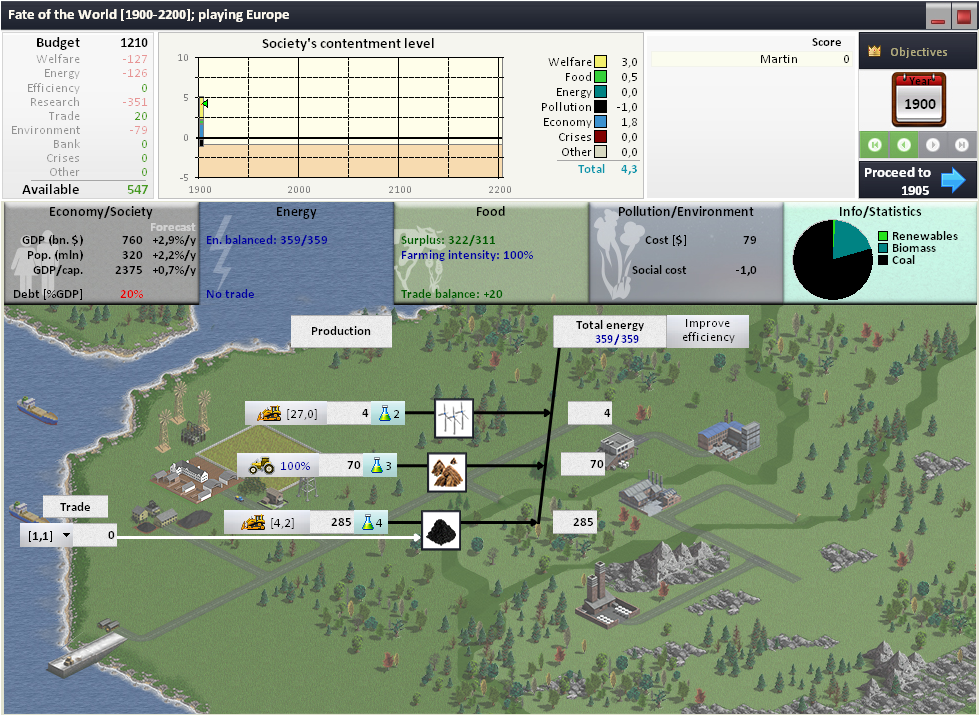
Energy panel AD 1900. World is simple. You have choice between primitive renewables, biomass and coal.
You can undertake decisions influencing your economy, society, agriculture, energy infrastructure and pollution controls. The aim is simple: make people happy. The better you meet their needs and avoid crises, the higher score you will have.
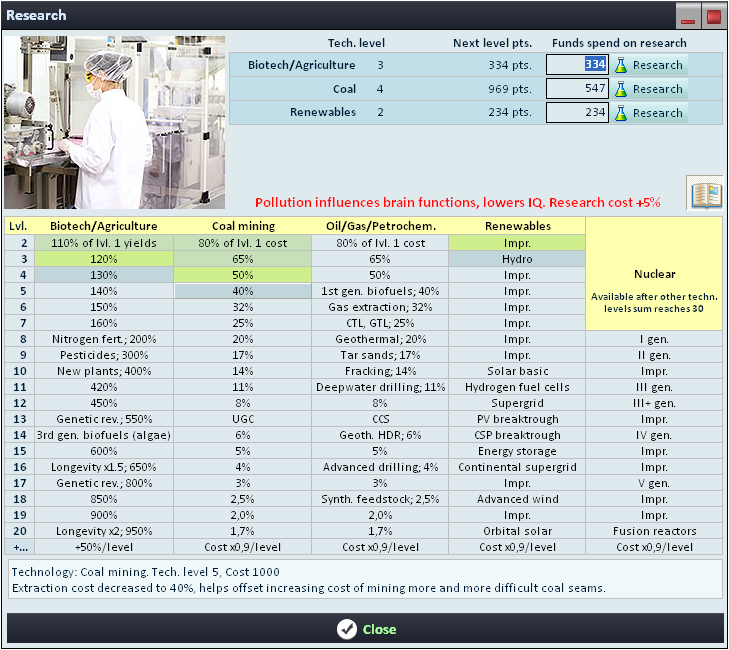
Better and cheaper technologies can help you grow a powerful economy. What energy technologies will you prioritize: fossil fuels extraction, renewable or nuclear? Every choice has its advantages and disadvantages.
The game realistically simulates key trends taking place during the growth of the industrial civilization. Demographic, economic data, energy use and extraction, food production and pollution are based on historical data. Models implemented in the game are also based on real data and dependencies. For example, game’s climate module is based on C-Roads model – algorithms and data are advanced enough that initialization of data for scenarios (GHG concentrations, carbon cycle, heat transfer in oceans, temperature growth, sea rise, ...) is performed just by tracking historic/forecasted GHG and sulphur aerosols emissions from 1750.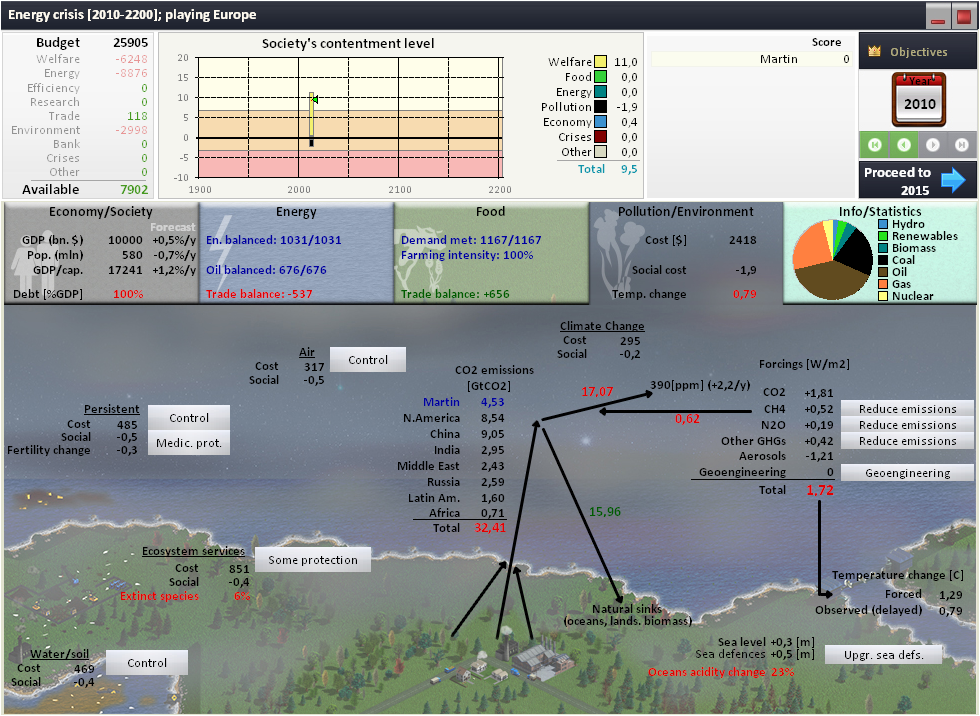
Pollution and climate change AD 2010. Can Europe influence the other major players enough to stop GHG emissions growth?
The game very realistically re-creates our choices and the history of our civilization in the XXth century, showing, that the strategy of exponential growth was a very logical choice and an efficient way to provide well-being to the people. Running the simulation further in time shows nevertheless, that sticking to this strategy for too long may lead to serious trouble, and if we want to preserve the achieved well-being and have a good and safe future, far reaching changes will be necessary. What’s more, the faster they take place, the easier the transition will be.
You can download the game here. Just download, unpack in a folder with writing rights and run WorldAtCrossroads.exe. Manual is available here.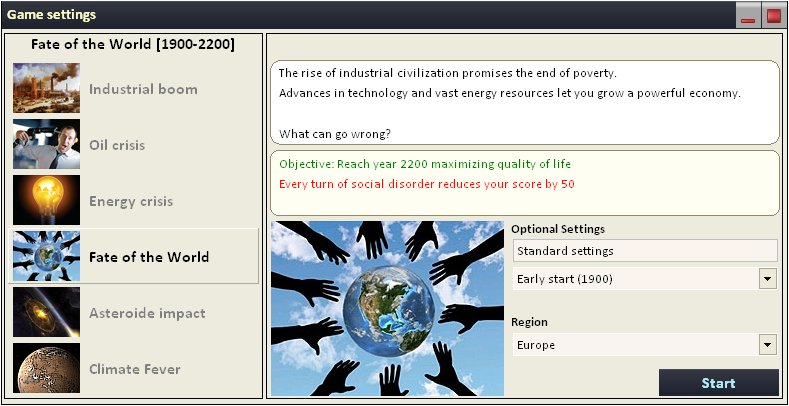
You have various scenarios to choose. What’s more, even the same scenario, played another region, may turn out to be a very different one.
You can start the game in 1900. Note that playing Europe or US is much different from playing Africa or India. You can also play today’s world, trying to pull it out of a series of incoming crises. You can try to build a world without fossil fuels. How about renewable or nuclear energy? You can check, how work breakneck growth and rapid technology development. You can also play a scenario, where you have to build a powerful economy, enabling you to destroy a huge asteroid being on a collision course with Earth – is it possible to maintain growth for centuries? Even if you hate all of humanity and other life on Earth and wish to exterminate it forever, You will find a scenario fitting your views. We invite you to play!
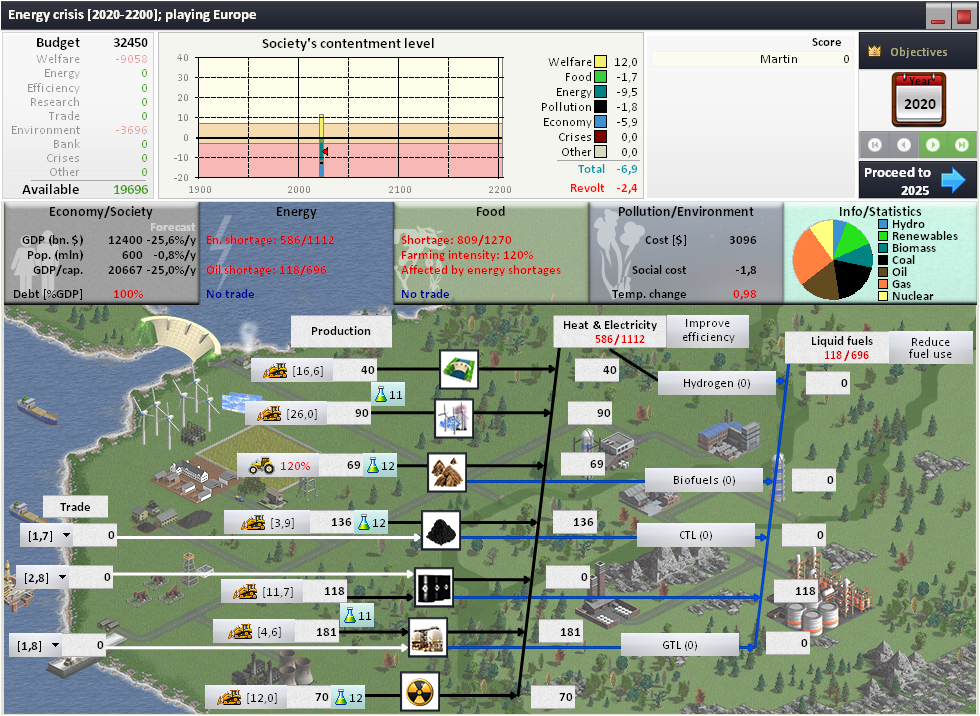
Energy panel AD 2020. World is a complex place. Can you take advantage of various options you have at your disposal?
Decisions have their consequences, though in many cases they manifest themselves years after. You will make decisions, face consequences and learn the connections. Playing the game you will notice that very often the most convenient in short-term decisions are a seed of a future trouble, and the actions aimed at a better future are costly and inconvenient in the short term. In the real world politicians prefer solutions that give quick payback – otherwise their chances for re-election would be dim. The ability to steer the country to the future, makes the difference between a politician and the statesman. Will you be a real one? Will you create a healthy economy, provide people with food and energy and limit adverse consequences of the climate change?
You are in charge of the civilization. Good luck!
We all know what to do,
we just don't know how to get re-elected after we've done it.
Jean-Claude Juncker on economic reforms































 Arguments
Arguments






























This sounds very interesting. I'd love to see some of these concepts adopted into mainstream simulations (e.g. Sid Meyer's 'Civilization' series), for developments up to the present, as a way to teach more people about the interactions.
However, I have to wonder how accurate predictions of future technology can be. It is possible solar power prices will drop to a fraction of fossil fuel prices in the next couple decades... or that some new process for extracting fossil fuels will allow them to remain the least expensive form of energy. I think what happens in the future has a lot to do with which technologies achieve these breakthroughs... and there just isn't any way for a simulation game to know how that is going to play out. Technologies we spend more funds researching have an advantage, but no guarantees.
In any case, by tying player choices to results determined by historical measurements and demonstrable processes this is a fantastic teaching tool. It also seems to have some economic policy elements... which is another area where belief and reality are often very very different (e.g. 'cutting spending during a depression will revive the economy!').
Limits to Growth is now available online:
www.donellameadows.org/the-limits-to-growth-now-available-to-read-online/
It is still a very good read.
Doesn't work. Any software support from these guys or suggestions from your end? The program doesn't even open.
LuisC - Perhaps you have a corrupt file. Try downloading again if you havent already, and be sure to extract all of the files in the zip into a regular folder. I just got it and it appears to run fine for me (Windows 7 machine).
In my formative University years there was a program developed to simulate the development of a nation. The interface was a real-time responding dot-matrix text printer (pretty slick at the time).
Through trial and error, what could be seen was that rapid industrialization produced a higher GDP, but with horrible social costs. A much slower, smaller scale economic development of cottage-style collective activities (no investors just making money because they had money), took much longer to produce higher GDP but never produced the horrible social consequences of rapid industrialization.
It is interesting to note that Global GDP has grown significantly faster than global population, yet there are still many people living in horrible poverty.
Slow and steady, sustainable development is possible and is better, except for those who want as much as possible for themselves as soon as they can get it.
Short-term interests are not helpful. And the interest rate spike of the late 1970s played a significant factor in magnifying the focus on the short term. Unfortunately, the recent long stretch of low interets rates has not undone that tragic change of attitude. It seems that our currently popular socioeconomic delusion is not only producing damaging development, it is significantly influencing people to "more desperately want more for themselves as soon as possible", which feeds the pursuit of damaging unsustainable behaviours.
A more fully informed population is the answer, but that is not easy to achieve.
Part of the required solution is an end to the success of "partial information deceptive marketing". Full information marketing is seldom used because it is boring, more expensive, and would probably produce results that are contrary to the ineterests of the people with the money to develop and deliver it. Full information about climate change is never used by those trying to discredit the scientific findings. It is also never used by promoters of a hoped to be "Profitable Pursuit".
Another part of a sustainable better future for all is the lifestyle of the most fortunate being sustainable. If the most fortunate were not consuming non-renewable resources and were not over-consuming the renewable resources "everybody could develp to be more fortunate - for a very long time", no conflict, no unneccessary poverty.
"It is interesting to note that Global GDP has grown significantly faster than global population, yet there are still many people living in horrible poverty."
By all metrics that I know of, increased GDP has led to reductions in poverty. A notable example is China, which has achieved rapid growth over the last 30 years (arguably stimulated by fossil fuel development amongst other things), and steep reductions in poverty. At the same time, the gap between rich and poor has widened.
While a sizable fraction of the world's population still live in poverty, this fraction has decreased over the last 50 years. In the short term at least, accelerated productivity seems to have been a boon to the impoverished. The future under a changing climate is generally assessed as less optimistic.
Barry,
Why is there still any "desperate poverty" if the GDP has grown so many times quicker than the population?
Every nation has the wealth to ensure that none of its people are desperately poor. The most fortunate nations have excess ability that can easily assist less fortuante nations. And yet that simple and possible to do thing "does not happen", except in small grudging ways, or only if the more fortunate see a bigger personal payback.
The probable explanation is the way that callous selfish interest can become popular. Marketing of mass-consumption consumerism promotes the "bad attitude". A higher percentage among the poor are willing to do more to help other poor people. That is because the callous greedy ones have a competetive advantage leading them to be concentrated among the more fortunate. That competetive advantage can also result in the callous greedy ones having more political and international trade infuence. It is easier to appeal to self interest than generosity. Guilt can be used to get better bahaviour out of the less generous, but guilt is not a sustainable way to get someone to behave in a more caring and considerate manner. Also, guilt does not work on the "career callous pursuers of more for themselves".
Great game. I just finished my first playthrough (rule the world/fate of the world) and finished (in 2200) with orbital solar panels, CO2 at 400 and falling (from a top of 480) and sea level at 2 meters above pre-industrial. My enlightened leadership was a resounding success ;-)
I was googling around for a forum where people can have a discussion about this game, but couldn't find anything. Are there plans to create something like that?
For Linux users: I tried it and played a couple of turns under Wine, so you don't need Windows to play it.
Didn't work. The program is running in the background but nothing displays.
Linux+Wine: me, too. No gyrations required.
@LuisC & others with technical problems
Plese check in order:
1. The game must be unpacked to a folder with writing rights - i.e. 'C:/WorldAtCrossroads', not 'C:/Program Files/WorldAtCrossroads' (which is write-protected)
2. On some computers the game may be blocked by an antivirus software (it was necessary to mark the file as "allowed" and everything run fine).
3. In one case the game run only on an admin account (not clear why, but it worked this way).
The above steps vere sufficient in every case - if the game still doesn't work, please send me an e-mail (marcin.popkiewicz@wp.pl), I'll do my best to help.
Many users refuse to open zip files without more security steps.. I wish there was a site to download the game directly.
That is puzzling to me. You are saying that you would open a downloaded executable but you wouldnt open a zip file? What do you mean by "download the game directly"?
None of that worked. I can run it only when the computer is in Safe Mode. I can't even established user rights on my own computer because of the disgusting piece of garbage that is Windows 7.
'2. On some computers the game may be blocked by an antivirus software (it was necessary to mark the file as "allowed" and everything run fine).'
How?
Meh, I guess I can just play it in Safe Mode. No big deal. Great game, by the way!
This game should allow you to decomission power plants ahead of schedule when you're playing as leader of the world. This will allow you to adjust your energy portfolio as soon as it is economically possible to do so.
There should also be thorium-based molten salt nuclear reactor technology available, since in reality it represents a fairly inexpensive path to abundant, cheap power that doesn't come with the risk meltdowns. It should be available as early as the 1980s, depending on your research priorities.
In general, the game seems to overstate the risk associated with nuclear power. To date, in the entire history of commercial nuclear power, there have been three notable nuclear accidents, Three Mile Island, Chernobyl and Fukushima. Of those three, only Chernobyl resulted in fatalities. The fatalities that accident produced, according to best estimates, numbers in the tens (I think the figure is between 40 and 70). This comes to .7-1.2 deaths per year worldwide for the entire nuclear industry. That's better than just about any other form of energy produciton.
It would also help if the game writers cleaned up their economics a little bit. A few things I noticed:
I was starting to go crazy because, on my Windows 7, I wasn't able to change the read only setting.
I tried everything, eventually I changed the UAC settings (START-RUN-"UAC", and you can put the setting on the lower level) and I succeeded.
See here:
http://itexpertvoice.com/home/fixing-the-windows-7-read-only-folder-blues/